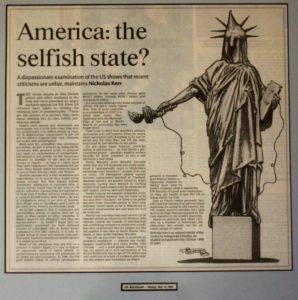From the pre-blog archives, this op-ed of mine appeared in Australia’s major daily newspaper, “The Australian”, on May 10, 2004.
 America: the selfish state?
America: the selfish state?
A dispassionate examination of the US shows that recent criticisms are unfair, maintains Nicholas Kerr
The recent abuses at Abu Ghraib prison and other incidents in the Iraq war have provoked an angry backlash against the US. Even US veterans have taken to writing the following sorts of commentaries: “These are the actions of a country that cares about nothing but its own selfish self-interest, period.”
Clearly such abuses and behaviors are inexcusable, but it is far from clear that they are symptomatic of a selfish people or country. A dispassionate examination of the US and its citizens suggests that such criticisms are unfair and unwarranted.
Start with the accusation that Americans are selfish. Selfish is defined as being chiefly concerned with personal profit or pleasure and takes on connotations of uncharitable, self-indulgent and greedy. In 2001 Americans donated on average 1.6 per cent of their income to charity – at least 2.5 times more than their neighbours, the Canadians (0.6 per cent). They donate around four times as much as one of their fiercest critics, the French.
Another popular slur is that Americans are materialistic, so of course they would throw money around. But that doesn’t explain Americans’ willingness to volunteer time. A recent survey found that 44% of US adults volunteer, representing the equivalent of over 9 million full-time employees at a value of US$239 billion. By way of comparison, 32% of Australians, 25% of Canadians and a mere 19% of the French do volunteer work.
All of this suggests that if Americans are uncharitable, greedy or selfish, they are no more so than people of other countries. It doesn’t disprove the allegation that they are self-interested – by which I mean they are particularly concerned for their own personal interest or advantage. But as Adam Smith explained in the 18th century, it is only by people acting in their self-interest that markets work, wealth is created and public welfare is a happy by-product.
What of the allegation that America the country is selfish? Again, it is easy to dispose of arguments about it being greedy or uncharitable by examining the generosity of its global aid and assistance. In 1998, the US gave US$8.8 billion in official development assistance. In the same year France gave US$5.7 billion, Canada US$1.7 billion and Australia $1 billion.
It is true that although the dollar amount of official US aid is vastly higher than that of most countries, as a percentage of GDP it is lower than many. But beginning with the Marshall Plan at the end of the World War II, its generosity has been longer lived.
That is not to deny that America’s primary motivation is its self-interest. From its recent trade agreement with Australia, to its war on terror and the cold war, the United States has been motivated by the benefits to the union.
On the global stage, however, countries acting in their own self-interest – as with Smith’s self-interested people – generate massive welfare benefits for other countries, so this is not obviously a bad thing.
Prime Minister John Howard correctly identified that the US-Australia free trade agreement is “axiomatically more to [Australia’s] advantage than America’s”. As part of its war on terror, US intelligence helped capture terrorist mastermind Hambali in Thailand. Hambali posed a far greater threat to Asian interests, having been decisive in shifting strikes from hard targets like embassies to soft targets such as bars and nightclubs.
Smith’s caveat for markets to operate in the overall national interest was for there to be law and order. Similarly, for there to be global benefits from countries acting in their own interests, there needs to be a framework of common international law and ways for it to be enforced. Surely the countries that most deserve to be labeled “selfish” are those run by dictators who operate outside the bounds of international law, trafficking weapons or people and attacking their neighbours. But we seldom see this tag applied to the likes of North Korea, Iran, Syria, or Iraq under Saddam Hussein.
The US, on the other hand, is generally an excellent neighbour – sharing the world’s longest undefended and open border with Canada – and a good global citizen. That it has not signed up to such agreements as the Kyoto Protocol is less a sign of US selfishness and more one of a lack of evidence surrounding the science and economics on which the protocol is founded. And France, which so vigorously insisted on taking more time to gather evidence while it stalled the UN Security Council over resolutions on Iraq, can hardly accuse it of being selfish for that.
Just as Pacific states generally benefit from the actions of a self-interested Australia, by acting in self-interest the US creates positive benefits over time and on average that are enjoyed by the vast majority of the world’s countries.
Abuse of prisoners and other such acts by a number Americans are abhorrent, but should not tar an entire people or nation.
Nicholas Kerr is an adjunct scholar of the Center for Independent Studies. He studied and worked in the US from 1999 to 2001.
Leave a Reply
You must be logged in to post a comment.